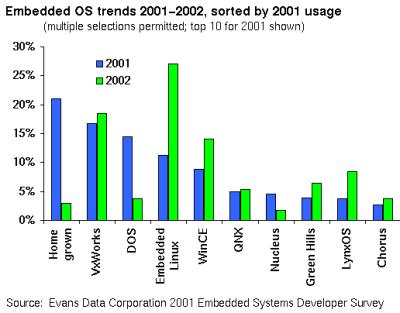Article: Why Microsoft is attacking Embedded Linux
Dec 20, 2001 — by LinuxDevices Staff — from the LinuxDevices Archive — 1 viewsMonopolist Microsoft has been up to its old tricks of late, publishing a lengthy and one-sided “comparison” of their newly introduced Windows XP Embedded with Embedded Linux. The document, entitled Why Microsoft Windows XP Embedded and Not Embedded Linux, compares XP Embedded to… Embedded Linux in eight different ways — asserting, as you might expect, that XP is superior in every possible way.
After learning of the Microsoft anti Embedded Linux document, LinuxDevices.com issued a “call to action”, noting that “Embedded Linux is not the product of a single dominant vendor, but rather is the result of the collaborative (and competitive) efforts of an entire market consisting of dozens of large and small companies plus thousands of individual developers,” and urging the Embedded Linux community to respond en masse to Microsoft's attack.
The Embedded Linux community quickly rose to the challenge, responding with sharply worded talkbacks, as well as in the form of lengthy, detailed, and sometimes entertaining rebuttals from Lineo and from LynuxWorks.
As the dust begins to settle, it's interesting to consider this question: Why has Microsoft's Embedded group aimed their big guns at Embedded Linux at this time?
Here are some clues . . .
Clue #1: Microsoft is losing to Linux in the general Embedded Market
A number of market studies, such Evans Data Corporation's “2001 Embedded Systems Developers Survey”, have consistently begun to report that tremendous strides have been made by Embedded Linux over the past 1-2 years.
Specifically, EDC's latest data says that Embedded Linux was the third most popular OS choice for new embedded system designs among 500 developers polled in 2001 — behind Wind River's VxWorks and Microsoft's DOS, and ahead of Microsoft's WinCE (see Figure).
Of greater significance, though, is that the results of the study suggest that Embedded Linux is poised to jump into first place, ahead of both Wind River's and Microsoft's offerings, within the next twelve months.

Clue #2: The stakes are extremely high in emerging “post-PC devices” markets
Another likely reason for Microsoft's growing concern with Embedded Linux is that major manufacturers like Hewlett-Packard, Sharp, and Motorola have recently begun delivering new consumer devices which contain Embedded Linux. These include handheld computers and TV set-top boxes — emerging markets with extremely high volume potential, which Microsoft undoubtedly wants to dominate.



New consumer devices from HP, Sharp, and Motorola have Linux inside
(Click each of the above images for details)
In the PDA space, where Microsoft has steadily gained ground on market-leader Palm, Embedded Linux may well be perceived as a “dark horse” disruptive technology. This is especially of concern given the growing popularity of Embedded Linux in the Far East, where most high volume consumer products are manufactured.
In contrast to the handhelds market, there is no established leader in the emerging markets for set-top entertainment systems and auto-PCs. These markets clearly have the potential to absorb more OS royalty stickers than desktop PCs, so it is not surprising that Microsoft would want to nip the early Embedded Linux lead in the bud.
More to come
Watch for the action to heat up further in these and similar high volume “post PC” markets in the coming months. According to rumors from Embedded Linux vendors such as Lineo, MontaVista, and Red Hat, there are literally hundreds of Embedded Linux based consumer devices in the pipeline — products which can't be discussed publicly until they're about to be shipped by their manufacturers.
All in all, 2002 promises to be another exciting year for Embedded Linux!
This article was originally published on LinuxDevices.com and has been donated to the open source community by QuinStreet Inc. Please visit LinuxToday.com for up-to-date news and articles about Linux and open source.